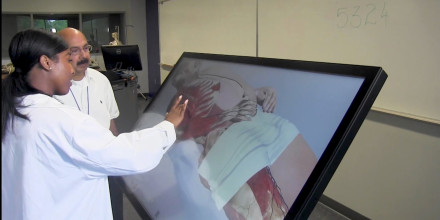
CHARLOTTE, N.C./Aug. 24, 2018 – Blue Cross and Blue Shield of North Carolina (Blue Cross NC) announced today an investment of $325,000 toward the Johnson C. Smith University (JCSU) Sustainability Village expansion. The investment will fund the construction of three new buildings and support year-round harvests to benefit West Charlotte communities.
The Sustainability Village was developed in 2013 by JCSU to address food access issues in the Northwest Corridor of Charlotte. The village launched with a greenhouse, aquaponics facility and hydroponics garden. Students at JCSU maintain facilities, market harvests and conduct outreach to local communities to promote nutrition education and community garden development. Harvests include fresh produce, vegetables and tilapia sold at two local farmers’ markets in West Charlotte.
“The Sustainability Village is an important step toward addressing food insecurity in West Charlotte,” said Mike Restaino, Blue Cross NC District Manager of Community Relations. “Improving the health and well-being of North Carolinians in West Charlotte is a goal JCSU and Blue Cross NC share, and one that sets an example for communities across the state.”
The Sustainability Village expansion will allow for the addition of two hydroponics facilities and one aquaponics facility that will increase production capacity between four to five times current levels. The resulting year-round harvest will play an integral role in addressing food access issues in the surrounding West Charlotte community.
“We hope to continue chipping at our mission of addressing food insecurity in the community, building our academic programs on campus and building stronger community partnerships aimed at addressing the unbearable social and economic inequalities that residents in our community face daily by virtue of their zip codes,” said Dr. Otienoburu, director of JCSU’s Center for Renewable Energy and Sustainability.
The Northwest Corridor represents two areas of Charlotte and Mecklenburg County considered to be food deserts. The USDA defines food deserts as “parts of the country vapid of fresh fruit, vegetables, and other healthful whole foods, usually found in impoverished areas. This is largely due to a lack of grocery stores, farmers’ markets and healthy food providers.”[1] The percentage of residents within greater West Charlotte that receive food and nutritional assistance ranges from 24 percent to 41 percent, with the nearest full-service grocery store at least 5-10 miles away.
Research has shown that greater coordination between health care organizations and communities in addressing social needs such as food insecurity can reduce overall health care expenditures by as much as 10 percent.[2] Addressing hunger and food access issues like those found in West Charlotte is an important part of improving overall community health outcomes within the city and the state.
“This partnership is pivotal in providing students opportunities to address food insecurity issues, as well as enhance their entrepreneurial spirit,” said JCSU President Clarence D. Armbrister. “We are grateful for this investment and look forward to continuing the work with Blue Cross North Carolina to change community health for the better.”
[1] Charlotte/Mecklenburg Quality of Life Explorer, Mecklenburg County, the City of Charlotte, and UNC Charlotte, 2017
[2] Expenditure Reductions Associated with a Social Service Referral Program, Population Health Management, 2018



